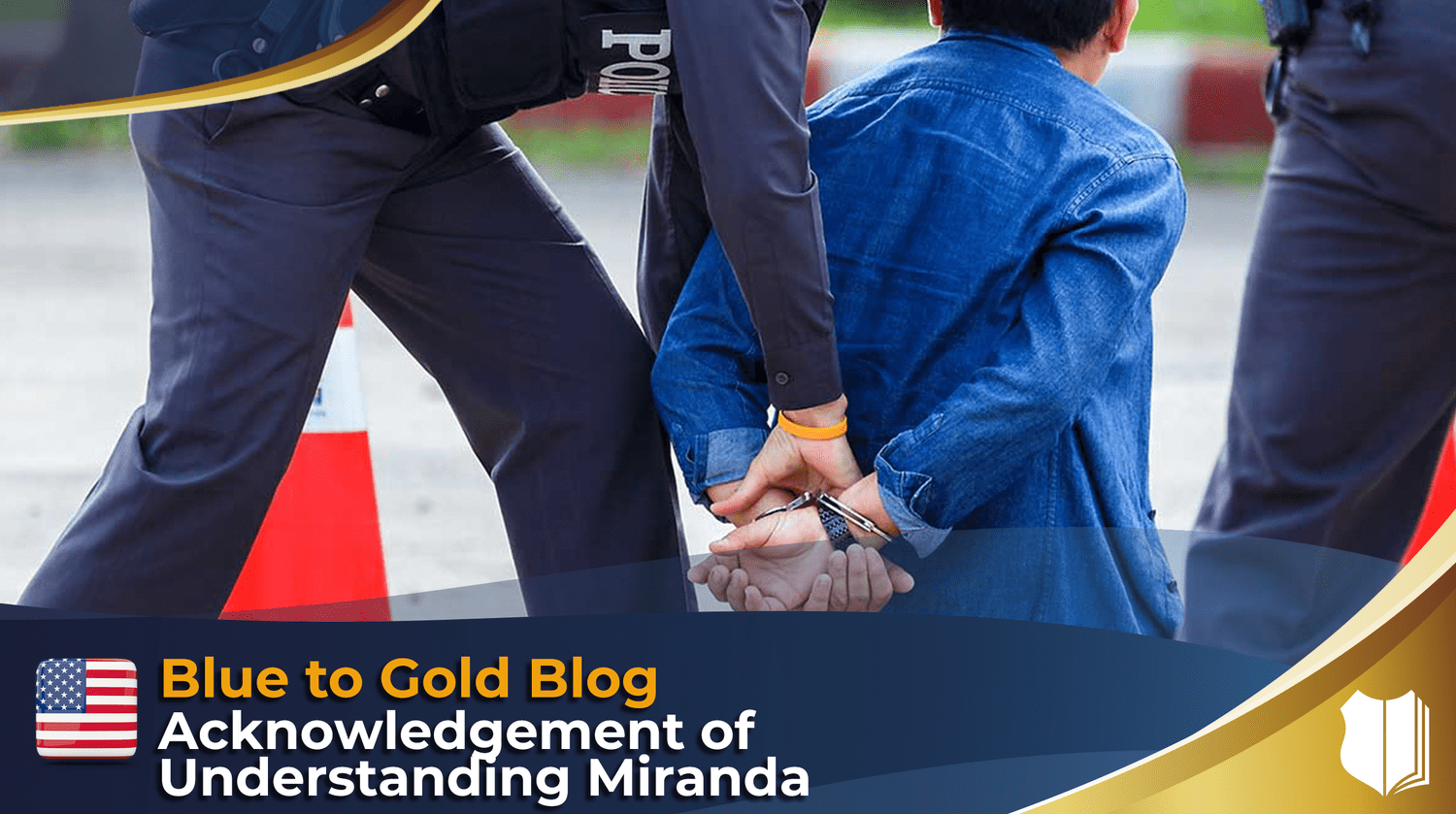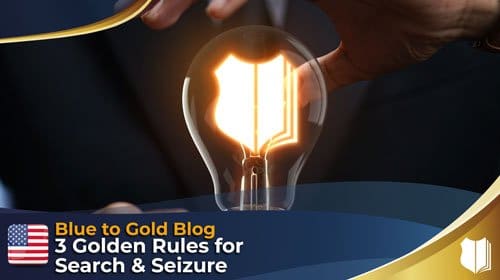

What is the Motor Vehicle Exception?
The automobile, or motor vehicle exception allows officers to search cars for evidence, contraband, and fruits or instrumentalities of crimes without a search warrant. When
or use our live chat
Customer Service


“If after reading a suspect his Miranda rights, he does not acknowledge that he understands them, but begins talking, can the officer continue with the interrogation?
This is John Wiehn, attorney and legal instructor for Blue to Gold Law Enforcement Training, with another question on a new topic.
In effect, basically, what we’re asking is, “Do I need an express statement acknowledging understanding from the suspect?” And the answer is “No.”
But let’s get into it. A suspect was found and arrested for an assault. He was read his Miranda warnings and did not respond when asked if he understood them and wanted to speak. Can the officer continue asking questions about the case? Or does not speaking imply that he doesn’t want to talk? Also, if the suspect started talking after a minute, does this mean he is willing to speak and further interrogation is permissible?
So basically, obviously, the first case that we will be dealing with here is the 1966 case, Miranda versus Arizona. And that is the most well known case in the United States and probably in the world. And it is what we all know from thousands and thousands of examples on movies and TV shows and cops and live PD, and body cam footage now.
The language of Miranda versus Arizona says that prior to any question, the person must be warned that he has the right to remain silent, that any statement he does make may be used as evidence against him, and that he has the right to an attorney. And if he cannot afford one, then the attorney will be appointed for him. Those are the rights that are required to be read by Miranda.
Now, the defendant basically can waive these rights. But that waiver has to be voluntary, knowing and intelligent. And if you vary significantly, from the language of Miranda versus Arizona, the burden is going to be on the officer to show that that waiver was made voluntarily and knowingly and intelligently.
California versus Prysock is a 1981 case. That’s the case that said substantial compliance with the language of Miranda v. Arizona is required. Alright. So what does knowingly, voluntarily and intelligently mean?
Well, voluntarily, let’s start with that. It can’t be coerced. You can’t beat confessions out of somebody. The the consensual nature must be such that the person’s free will wasn’t overborne. The government’s authority wasn’t so overbearing, that the person lacked freewill and basically didn’t have a choice in the matter.
And then knowingly means they have to be informed of their rights, and then intelligently means they have to have understood their rights. So when we talk about knowingly, I mean, basically, aren’t we at knowingly already? I mean, this case has been around for 56 years. As already mentioned, there have been countless examples on TV and in movies. People know their Miranda rights. But the bottom line is that the burden, the onus, is going to be on the prosecutor to show that this waiver was voluntarily, knowingly and intelligently made. So help that prosecutor out. Read the rights from a department issued card, verbatim.
Now, to show that the rights were waived, the waiver must have been obtained intelligently. Intelligently means that they not only knew their rights, but that they understood them. They understood what it was you were saying and the implications of what was going to happen if they waived them.
Officers are technically not required to obtain an express waiver and express understanding of “yes,” and express acknowledgement of “yes, I understand my rights.” A lot of officers do you say, “Do you understand these rights as I’ve read them to you? I need a yes or no.” Then you get that express acknowledgement of their understanding of their rights. However, that’s not required.
Courts can look at it and say that under a totality of the circumstances approach, we can make a determination. Did they intelligently waive these rights? Did they understand the rights? However, it’s going to be a totality of circumstances analysis. If you obtain that expressed acknowledgement of understanding, then you don’t need to have your prosecutor fight through this.
Courts look at the totality of circumstances here. They will look at their criminal history, look at their familiarity with the legal process, look how many times they’ve been down this road, look at their their command of the English language. All those factors are going to go into it.
And of course, a prosecutor is not going to meet to fight that battle, if you obtain that express, knowing, and intelligent waiver. The 1986 case, Moran v. Burbine is the case that held that you don’t need to get that express acknowledgement of that express understanding.
However, you’re playing a dangerous game if you don’t. So to answer the original question, he doesn’t say that he understands but begins talking. Can the officer continue with the interrogation? The answer is “yes.” But it’s not the best way to do it. Absolutely not.
Get that express acknowledgement. Lock in that intelligent waiver and say, “Do you understand your rights?”
“Uh huh.”
“No, sir. I need a yes or a no.”
“Yes.”
And then continue with your investigation.
I hope this helps. Please, if you have any questions, don’t hesitate to submit them to us at blue to gold.com/show. We’ll do what we can to help you make sure you get it right every time. Stay safe.


The automobile, or motor vehicle exception allows officers to search cars for evidence, contraband, and fruits or instrumentalities of crimes without a search warrant. When


These three golden rules come from reading thousands of court cases over the last 20 years and seeing a theme regarding what the courts are


This question is: Can you look inside a woman’s purse, or a man’s backpack during a pat down? The answer is, “Maybe.” Here’s how this


Here is the question: Can an officer reach slightly into a person’s home to pull them out and arrest them? If an officer has probable
© Blue to Gold, LLC. All rights reserved